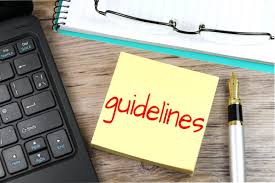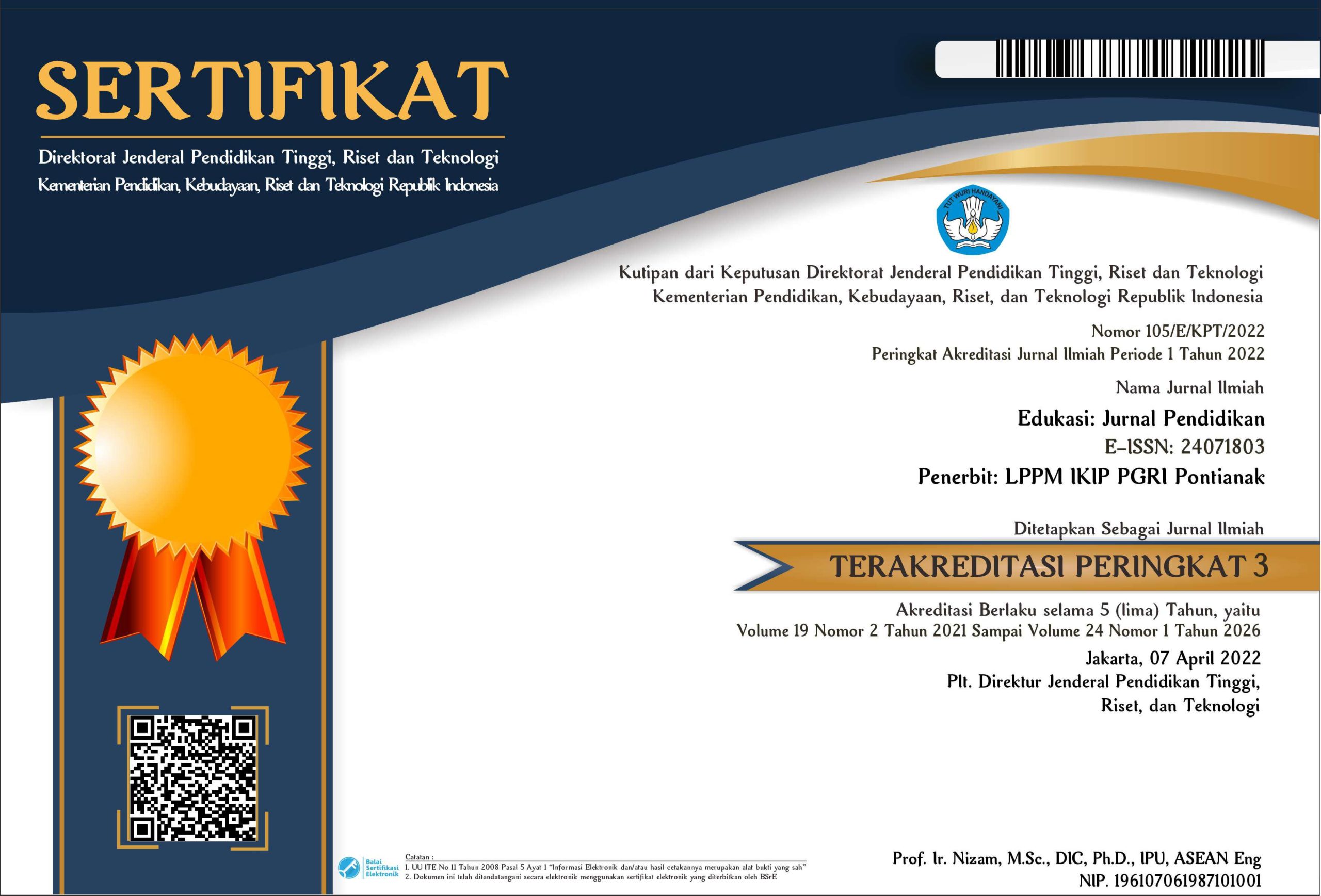THE TEACHER'S TPACK ABILITY INTEGRATED LOCAL WISDOM TO SUPPORT THE ACHIEVEMENT OF PANCASILA STUDENT PROFILE
DOI:
https://doi.org/10.31571/edukasi.v23i1.7678Keywords:
TPACK, local wisdom, Pancasila student’s profile, merdeka curriculum, IPASAbstract
This study examines teachers” TPACK skills in integrating local wisdom into IPAS learning to develop the Pancasila student profile at SD Muhammadiyah Bangka Belitung. The research method is descriptive qualitative. Data collection techniques are questionnaires, observation sheets, documentation, and interviews. Data analysis techniques use descriptive, quantitative, and qualitative methods. The results showed that teachers had implemented TPACK even though they did not realise the practice was included in the TPACK framework. The highest aspects were PK and TPK, while the lowest were TK and TCK. Local wisdom-based learning successfully stimulates the dimensions of the Pancasila learner profile, such as faith, creativity, independence, and mutual cooperation. However, the achievement of Pancasila learner profile indicators is still in the range of 36-75% due to the lack of teacher training. The recommendation is to increase TPACK training, especially in the TK and TCK aspects, and understanding of the Merdeka curriculum.
Downloads
References
Akhwani. (2020). Integration of TPACK as a Basic Framework for 21st Century Learning: An Analysis of Professional Teacher Competencies. 1st International Conference On Information Technology And Education (ICITE 2020), 508(Icite), 291–296.
Antony, M. K., Paidi, Subali, B., Pradana, S. P., Hapsari, N., & Astuti, F. E. C. (2019). Teacher’s TPACK Profile: The Affect of Teacher Qualification and Teaching Experience. Journal of Physics: Conference Series, 1397(1).
Beri, N., & Sharma, L. (2021). Development of TPACK for Teacher-Educators : A Technological Pedagogical Content Knowledge Scale. Linguistics and Culture Review, 5(June), 1397–1418.
Biswal, S., & Behera, B. (2023). Enhancing Science Process Skills through Inquiry-Based Learning: A Comprehensive Literature Review and Analysis. International Journal of Science and Research, 12(8), 1583–1589.
Boisandi, & Anita. (2017). Material Solar Cell Berbasis Tpack. Jurnal Edukasi, 15(1), 1–10.
Bray, D. A., Girvan, D. C., & Chorcora, E. N. (2023). Students’ perceptions of pedagogy for 21st century learning instrument (S-POP-21): Concept, validation, and initial results. Thinking Skills and Creativity, 49(May 2022), 1–14.
BSKAP. (2022). Keputusan Kepala BSKAP No.008/H/KR/2022 Tahun 2022. Badan Standar, Kurikulum, Dan Asesmen Pendidikan, 021, 2.
Demirtaş, B., & Mumcu, F. (2021). Pre-Service Teachers’ Perceptions of ICT and TPACK Competencies. Acta Educationis Generalis, 11(2), 60–82.
Elvianasti, M., Lestari, N. H., Maesaroh, M., Irdalisa, I., Yarza, H. N., & Rikizaputra, R. (2023). Pelatihan Penyusunan RPP IPA Blended Learning Berbasis TPACK Sebagai Upaya Guru dalam Menghadapi Pembelajaran Pasca Covid-19. GERVASI: Jurnal Pengabdian Kepada Masyarakat, 7(1), 125–134.
Fitriana, L., Hendriyanto, A., Sahara, S., & Akbar, F. N. (2021). Digital Literacy: The Need for Technology-Based Learning Media in the Revolutionary Era 4.0 for Elementary School Children. International Journal of Progressive Sciences and Technologies (IJPSAT, 26(1), 194–200.
Fitriani, R., Anatri, L., Joint, O. S., & Risnita, R. (2023). Scope of Learning Evaluation in Science Subject in Junior High School Students: A Systematic Review. Journal Evaluation in Education (JEE), 4(1), 08–16.
Ghufron, S., Rulyansah, A., & Saputri, T. (2024). Effectiveness of Innovative Learning Media in Elementary Schools during the Covid-19 Pandemic. Pegem Journal of Education and Instruction, 14(3), 230–242.
Gizaw, G. G., & Sota, S. S. (2023). Improving Science Process Skills of Students: A Review of Literature. Science Education International, 34(3), 216–224.
Gubasheva, K. A., Temirova, A. B., & Madaev, S. M. (2023). Modern Technologies as Important Tools for Environmental Education During the Environmental Crisis. SHS Web of Conferences, 172, 1–8.
Guerra-Macías, Y., & Tobón, S. (2025). Development of transversal skills in higher education programs in conjunction with online learning: relationship between learning strategies, project-based pedagogical practices, e-learning platforms, and academic performance. Heliyon, 11(2).
Halabieh, H., Hawkins, S., Bernstein, A. E., Lewkowict, S., Unaldi Kamel, B., Fleming, L., & Levitin, D. (2022). The Future of Higher Education: Identifying Current Educational Problems and Proposed Solutions. Education Sciences, 12(12).
Hewindati, Y. T., Kurniati Handayani, S., Zuhairi, A., & Gerungan, R. A. (2023). Review of learning materials of an ecology course at Universitas Terbuka. Asian Association of Open Universities Journal, 18(2), 132–143.
Idris, N., Talib, O., & Razali, F. (2022). Strategies in Mastering Science Process Skills in Science Experiments: a Systematic Literature Review. Jurnal Pendidikan IPA Indonesia, 11(1), 155–170.
Iftikhar, S., Farooq, V., Muslim, A., Lashari, T. A., Khan, I., Lashari, S. A., Naeem, F., & Javed, M. Z. (2023). Examining the Need for an Integrated Framework: Exploring the Intersection of Technological Pedagogical Content Knowledge (TPACK) in Entrepreneurship Competency Development, STEAM Education, and Gamification. Journal of Xi’an Shiyou University, Natural Science Edition, 19(06).
John W. Creswell. (2014). Research Design: Qualitative, Quantitative and Mixed Methods Approaches (4th ed.). Sage Publication Ltd.
Joynes, C., Rossignoli, S., & Amonoo-Kuofi, E. F. (2019). 21st century skills: Evidence of issues in definition, demand and delivery for development contexts. In (K4D Helpdesk Report) (Issue August).
Khairatunnisa. (2022). Implementasi kurikulum merdeka dalam proses pembelajaran bahasa berbasis teknologi informasi dan komunikasi. Jurnal Pendidikan, 7(2), 94–99.
Klemer, A., Segal, R., Miedijensky, S., Herscu-Kluska, R., & Kouropatov, A. (2023). Changes in the attitudes of mathematics and science teachers toward the integration and use of computerized technological tools as a result of the COVID-19 pandemic. Eurasia Journal of Mathematics, Science and Technology Education, 19(7).
Komarudin, & Suherman. (2024). An Assessment of Technological Pedagogical Content Knowledge (TPACK) among Pre-service Teachers: A Rasch Model Measurement. REVISTA DE MEDIOS Y EDUCACIÓN, 71, 59–82.
Lyublinskaya, I., & Kaplon-Schilis, A. (2022). Analysis of Differences in the Levels of TPACK: Unpacking Performance Indicators in the TPACK Levels Rubric. Education Sciences, 12(2).
Mertens, D. M. (2005). Research and Evaluation in Education and Psychology. Thousand Oaks, CA: Sage Publications.
Morales, M. P. E., Avilla, R. A., Sarmiento, C. P., Anito, J. C., Elipane, L. E., Palisoc, C. P., Palomar, B. C., Ayuste, T. O. D., & Ramos-Butron, B. (2022). Experiences and Practices of STEM Teachers through the Lens of TPACK. Journal of Turkish Science Education, 19(1), 233–252.
Myers, M. D. (1997). Qualitative Research in Information Systems. June.
Putri, A. S., Prasetyo, Z. K., Purwastuti, L. A., Prodjosantoso, A. K., & Putranta, H. (2023). Effectiveness of STEAM-based blended learning on students’ critical and creative thinking skills. International Journal of Evaluation and Research in Education, 12(1), 44–52.
Rahayu, S. (2020). Technological Pedagogical Content Knowledge ( TPACK ): Integrasi ICT dalam Pembelajaran IPA Abad 21. Prosiding Seminar Nasional Pendidikan IPA IX Tahun 2017, February.
Raj, R. G., & Devi, S. N. (2014). Science Process Skills And Achievement In Science Among High School Student. Scholarly Research Journal For Interdisciplinary Studies, 2(15), 2435–2443.
Roshid, M. M., & Haider, M. Z. (2024). Teaching 21st-century skills in rural secondary schools: From theory to practice. Heliyon, 10(9), e30769.
Sakdiah, H., Ginting, F. W., Rejeki, N. S., & Miranda, A. (2022). Pembelajaran STEAM Terhadap Keterampilan Proses Sains Ditinjau dari Sikap Ilmiah Mahasiswa pada Mata Kuliah Kajian Fisika Kejuruan. Jurnal Penelitian Pendidikan IPA, 8(5), 2531–2536.
Sari, W. P., & Mega, I. R. (2022). Prospective Elementary Science Teacher in Developing Lesson Plan through Integration of STEM-Based TPACK. Jurnal Pendidikan MIPA, 12(September), 682–689.
Sari, W. P., & Mega, I. R. (2023). Analisis Kemampuan TPACK Terintegrasi STEM Calon Guru SD Pembelajaran IPA dalam Menumbuhkan Nilai Edusciencetechnopreneur. Cendekiawan, 5(1), 71–84.
Schmidt, D. A., Thompson, A. D., Koehler, M. J., & Shin, T. S. (2014). Technological Pedagogical Content Knowledge (TPACK): The Development and Validation of an Assessment Instrument for Preservice Teachers. CIE 2014 - 44th International Conference on Computers and Industrial Engineering and IMSS 2014 - 9th International Symposium on Intelligent Manufacturing and Service Systems, Joint International Symposium on "The Social Impacts of Developments in Informat, 42(2), 2531p.
Seixas, B. V., Smith, N., & Mitton, C. (2018). The qualitative descriptive approach in international comparative studies: Using online qualitative surveys. International Journal of Health Policy and Management, 7(9), 778–781.
Smith, K., Maynard, N., Berry, A., Stephenson, T., Spiteri, T., Corrigan, D., Mansfield, J., Ellerton, P., & Smith, T. (2022). Principles of Problem-Based Learning (PBL) in STEM Education: Using Expert Wisdom and Research to Frame Educational Practice. Education Sciences, 12(10), 1–20.
Sumardi. (2023). The Implementation of PBL-STEAM Equipped with JBatik Software as Learning Media to Enhance Students’ Creative Thinking Skills in Designing Batik Motifs of Indonesian Local Heritage. International Journal of Current Science Research and Review, 06(05), 2988–3007.
Suryanti, S., Mariana, N., Yermiandhoko, Y., & Widodo, W. (2020). Local wisdom- based teaching material for enhancing primary students ’ scientific literacy skill. Jurnal Prima Edukasia, 8(1), 96–105.
Talan, M. R. (2018). Pengembangan Buku Suplemen Teks Negosiasi Bermuatan Kearifan Lokal Timor Dengan Pendekatan Content Language Integrative Learning. Jurnal Pendidikan (Teori Dan Praktik), 3(1), 24–33.
Thappa, S., & Baliya, J. (2022). Teachers ’ Techno-Pedagogical Competencies in Social and Professional Contexts Teachers ’ Techno-Pedagogical Competencies in Social and Professional. Indian Journal of Natural Sciences Vol.13, 13(December).
Tolochko, S., Bordіug, N., Mironets, L., Mozul, I., & Tanasiichuk, I. (2023). Forming ecological culture in educational applicants within the context of modern education. Revista Amazonia Investiga, 12(61), 41–50.
Valtonen, T., Eriksson, M., Kärkkäinen, S., Tahvanainen, V., Turunen, A., Vartiainen, H., Kukkonen, J., & Sointu, E. (2023). Emerging imbalance in the development of TPACK - A challenge for teacher training. Education and Information Technologies, 28(5), 5363–5383.
Wu, Y. T., Chai, C. S., & Wang, L. J. (2022). Exploring secondary school teachers’ TPACK for video-based flipped learning: the role of pedagogical beliefs. Education and Information Technologies, 0123456789.
Yildiz, C., & Guler Yildiz, T. (2021). Exploring the relationship between creative thinking and scientific process skills of preschool children. Thinking Skills and Creativity, 39(February), 100795.
Downloads
Published
How to Cite
Issue
Section
License
Copyright (c) 2025 Diana Pramesti, Winda Purnama Sari

This work is licensed under a Creative Commons Attribution-NonCommercial 4.0 International License.
Authors who publish in this journal agree to the following terms:
- Authors retain copyright and grant the journal the right of first publication with the work simultaneously licensed under a Creative Commons Attribution License (CC-BY-NC) that allows others to share the work with an acknowledgment of the work's authorship and initial publication in this journal.
- Authors are able to enter into separate, additional contractual arrangements for the non-exclusive distribution of the journal's published version of the work (e.g., post it to an institutional repository or publish it in a book), with an acknowledgment of its initial publication in this journal.
- Authors are permitted and encouraged to post their work online (e.g., in institutional repositories or on their website) prior to and during the submission process, as it can lead to productive exchanges, as well as earlier and greater citation of published work.

 Download: 38
Download: 38














